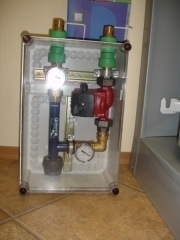While rates on electric energy are constantly rising, the energetic effectiveness of heating equipment gains more importance. Electrode boilers "BERIL" were primarily oriented towards the economy of their use in heating systems. Now this principle is also retained: "BERIL" offers energy saving solutions.
"BERIL" boilers use 10-20% (depending on their power) of electric energy less than any other electric boilers. The automation of boilers allows sustaining the same temperature in the room twenty four hours a day. Programmed maintenance of the boiler using a mobile GSM connection will lower user's expenditure of electric energy by another 20 - 30%.
The issue of ionic boilers "BERIL V.I.P." was the next stage of working on increased comfort and economy of electrode boilers "BERIL". The difference between them is that in the on-line mode of ionic boilers the amount of electric charges-ions is controlled with the help of digital control system (DCS), and the movement of those electric charges-ions between electrodes ensures heating of heat carriers.
Being a component part of the ionic boiler, symistor control unit enables a noiseless change of power (once a millisecond) and does not produce electric or radio interferences. The algorithm of performance of the circulation pump is maintained automatically regarding individual peculiarities of every heating system.
The implementation of DCS in ionic boilers "BERIL V.I.P." ensures the performance of heating system in PID (Proportional - Integral - Differential) mode of controlling the temperature of a heat carrier or the temperature of the air in the room.
When the standard control method with the sensor of the air temperature inside the room is applied the following happens: if the temperature in the room drops lower than the designated one, the heating system turns on and maximally (according to the temperature of the heat carrier) heats the room until the temperature of the room reaches the designated one. The sensor of the air temperature in the room turns on, then, (after the heating is off) a great amount of excess heat is emitted from the overheated heating circuit. The process repeats itself when the system is cooling and turns on again. Eventually, the imperfection of the method results in over-expenditure of electric energy (up to 30%).
The strategy of the PID regulator which includes an enhancer, an integrator and differentiator is the following: having detected an incompatibility (a difference between the designated and the actual temperature) on its input, firstly, the enhancer of the regulator turns on the boiler to its fullest, but strictly in doses, compensating a considerable part of the incompatibility. Then, the integrator performs its part by slowly (in order not to get over the predetermined point of temperature) approximating the temperature to the designated one. The differentiator, which reacts to the speed of change, speeds up the performance of the boiler in cases when the temperature rapidly deviates from the predetermined parameters (an opened window leaf, doors opened wide, a broken window, etc.).
Conclusion: implementation of DCS and the PID regulator in the heating system with the boiler "BERIL V.I.P." allows getting rid of the over-expenditure of electric energy manually or in an automatic mode by alternating the power of the boiler as well as the time and speed of heating the room. Thus, the total number of saving energy while using ionic boilers in heating systems is 30-45%. Moreover, connecting a remote control unit with programmed maintenance of temperature modes for any hour and any day of the week with a possibility to use a mobile GSM connection increases this number to 70-75%.
BERIL SIA
Riga, Ieriku st. 48
phone: +371-67-501262
mobile phone: +371-26-605309
http://www.beril.lv/

